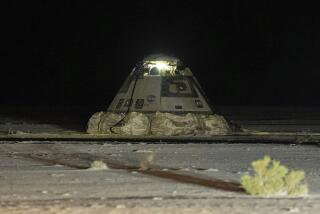Columbia Launch Delayed Until May 31
- Share via
KENNEDY SPACE CENTER, Fla. — A series of mechanical and computer problems has delayed the flight of the space shuttle Columbia until May 31 at the earliest, NASA officials said Tuesday.
Columbia, carrying a cargo of life sciences experiments, had been scheduled for launch at 5 a.m. PDT this morning.
The 10-day delay will give ground crews here time to change nine temperature sensors that officials fear may break off during flight, damaging the orbiter’s rocket motors, as well as two computers that developed mechanical glitches at the last moment.
The four-man, three-woman crew of Columbia is planning to conduct a series of experiments designed to test the ability of humans to adapt to the microgravity conditions of space, setting the stage for long-term occupation of a manned space station, as well as a proposed manned flight to Mars.
The disappointed crew was scheduled to return to Houston this morning to await completion of the repairs.
The primary source of concern, according to NASA test director Mike Leinbach, was the potential fragility of the temperature sensors, which are located in the liquid hydrogen and oxygen fuel tanks, as well as in the lines carrying the super-cold fluids to the orbiter’s main engines.
During a fuel-loading test last fall, one of the sensors on Columbia cracked, permitting a small hydrogen leakage. The sensor was removed and sent back to its manufacturer, RDF Corp. in Hudson, N.H., where technicians found a faulty weld.
But the results of those tests were not available to NASA officials until late Monday night, just before Kennedy Space Center technicians were scheduled to begin loading the shuttle’s cargo of 30 rats and 2,700 tiny jellyfish aboard. Leinbach said he had no idea why it took so long for the test results to reach NASA officials.
The flight was immediately postponed for one day to assess the problem, and National Aeronautics and Space Administration officials ultimately decided to replace all of the sensors rather than run the risk that one would break off and be carried through the fuel lines to an engine, where it would cause serious damage and threaten the safety of the launch.
The technicians also are taking the opportunity to replace two computers that have proved balky during preflight activities. The first is a general purpose computer, one of four aboard Columbia. The shuttle carries a spare fifth computer that can be installed in orbit if necessary.
The second and more complex computer is a so-called multiplexer/demultiplexer that serves as a translator between the shuttle’s general purpose computers and other electronic systems. One of 23 such computers aboard Columbia, this one controls functions for the solid rocket boosters, orbiter hydraulic systems and the orbital maneuvering system.
The unit, which had malfunctioned for several hours Tuesday morning, seemed to be functioning normally by noon, but officials decided to replace it at the same time they were changing the sensors, Leinbach said. That repair job will take eight to nine days.
NASA officials had hoped to break its record of three shuttle launches within two months, but this delay will push Columbia past the 54-day mark.
More to Read
Sign up for Essential California
The most important California stories and recommendations in your inbox every morning.
You may occasionally receive promotional content from the Los Angeles Times.













